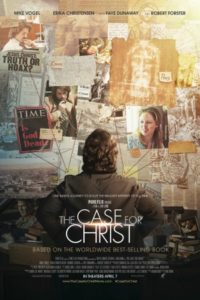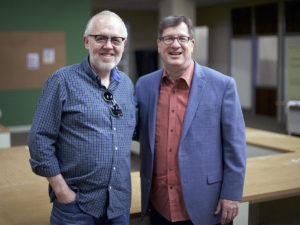Based on the true story of an award-winning journalist who, working to disprove the newfound Christian faith of his wife, begins chasing down the biggest story of all time–with unexpected, life-altering results…
HOW IT BEGAN
 A hard-driving journalist, Lee Strobel was exactly where he expected to be at work: on top. His award-winning investigative reporting recently earned him a promotion to legal editor at the Chicago Tribune. But things weren’t going nearly as well at home where his wife Leslie’s newfound faith in Christ went against everything Lee believed—or didn’t believe—as an avowed atheist.
A hard-driving journalist, Lee Strobel was exactly where he expected to be at work: on top. His award-winning investigative reporting recently earned him a promotion to legal editor at the Chicago Tribune. But things weren’t going nearly as well at home where his wife Leslie’s newfound faith in Christ went against everything Lee believed—or didn’t believe—as an avowed atheist.
Utilizing his journalistic and legal training, Lee begins a quest to debunk the claims of Christianity in order to save his crumbling marriage. Chasing down the biggest story of his career, Lee comes face-to-face with unexpected results that could change everything he knows to be true.
Based on Lee Strobel’s award-winning bestselling book and starring Mike Vogel, Erika Christensen, Faye Dunaway, and Robert Forster, THE CASE FOR CHRIST opens in theaters April 7. It’s an ideal Easter-season movie for anyone who has ever pondered the existence of God–and what role He could play in their lives…
BRINGING IT TO THE BIG SCREEN
It’s a hot summer day in the South, and Atlanta in 2016 is about to become Chicago in 1980. Trucks roll in, equipment rolls out, cast and crew prepare, and production begins on Pure Flix’s feature film version of THE CASE FOR CHRIST.
For Lee Strobel, who wrote the international best-seller, The Case for Christ, a lot of it was new. “I had never seen firsthand a story taken from concept to production,” Lee said. Still, he was no stranger to film production. In fact, his work on another Pure Flix film had led him to this Atlanta set.
Michael Scott, CEO and Co-Founder of Pure Flix and a producer on THE CASE FOR CHRIST, read Lee’s book after producing the hit GOD’S NOT DEAD. Upon meeting Lee, who appeared in the sequel, GOD’S NOT DEAD 2, he learned Lee’s life story of journeying from atheism to faith, and saw in the story a compelling film.
“It was so incredible that I thought a lot of people around the world would like to hear it,” Michael said.
But who would write it?

Bird and Strobel on set
Brian Bird (When Calls the Heart, Captive, Touched by an Angel and Step by Step) is a well-known Hollywood screenwriter and man of faith. He also was a longtime friend of Lee Strobel, although they had fallen out of touch. One Sunday, Brian, at home in Colorado, learned that Lee would be speaking at a church in town. Brian decided to attend, hoping to reconnect.
Interestingly, at the same time, Brian was in talks with Pure Flix about a completely unrelated writing project. The day that Lee spoke in Colorado, talking to Brian, he mentioned that the Pure Flix team was considering a film about his life.
Lee wondered if Brian would consider writing it. To Brian, it was clear, “God was weaving things together for good.”
“If I had wanted to watch football that Sunday, this probably wouldn’t have happened,” Brian said. “It left me feeling something special was going on here.”
The first day of shooting in Atlanta required turning a 2016 movie theater into the old movie theater Willow Creek Community Church rented each week as a sanctuary, circa 1980. Today, each week, 24,000 people attend Willow Creek services. In Lee’s story, the church was just five years old and meeting in the theater.
Fashions of the ‘80s, meanwhile, came alive with bushy-haired actors and brightly colored, form-fitting clothes. In fact, this challenge to recreate another time period had attracted the film’s director.
“I’ve always wanted to do a period piece set in the 1980s,” Jonathan M. Gunn said.
But there was something more, there was a palpable desire to tell Lee and Leslie Strobel’s compelling story.
“I love the idea of an honest exploration of faith,” Jonathan said. “A man’s search for truth is motivated by his love for his family. Another thing I really like is his skepticism. We can look at God and religion from the view of someone seeking to disprove it. This guy’s wife has found a faith he disagrees with. It’s an interesting way in.”
Like Lee and Brian, Jonathan came to the production through longstanding relationships. He had known David A.R. White, Co-Founder and Managing Partner of Pure Flix, for 25 years. In fact, David acted in Jonathan’s college thesis film project. Pure Flix mentioned the project to him and mentioned writer Brian Bird, whom Jonathan had long known and respected.

Vogel and the Strobels on set
Meanwhile, personal connections to Lee’s story weave throughout the film team. Mike Vogel—Lee in the film—first read the book as a teenager. Like Lee, Mike’s own journey to belief involved him closely investigating and evaluating the faith he had been raised in.
“I had to set aside what others say and get one-on-one with ‘who do you say I am?’” Mike said. “I dove into apologetics and debate—C.S. Lewis, Tim Keller, Ravi Zacharias and, of course, Lee Strobel. The book rocked my world.”
Another thing that attracted Mike to the role was how the film portrays the reality of Lee and Leslie’s life.
“Life is messy, and if we’re going to show that you’re excited about the end result (of a faith journey), you’ve got to show what happens before,” Mike said. “We need to show where God comes into the picture. We need to show where, but for Christ, I’m no different.”
Screenwriter Brian Bird calls THE CASE FOR CHRIST a “game-changing film.”
“It’s like no film that I’ve seen before. Strobel’s true story is a paradigm-busting kind of movie,” he said. “The hero of the movie hates God for 90 percent of the movie. You don’t have to be a Christian to appreciate a story of someone going on a spiritual journey. If you’re looking for answers, you can’t ignore this journey. Feel free to check out all the other things, too, but if you ignore this journey in THE CASE FOR CHRIST, you’re not being intellectually honest.”
Erika Christensen plays Leslie Strobel and echoes thoughts of the film’s appeal to a diverse audience.
“We are making a movie for a broad audience, to reach people emotionally across an array of belief systems,” Erika said. “At the core it’s about respect. It’s about personal integrity. It’s about finding what you see and believe and then living by that.”


